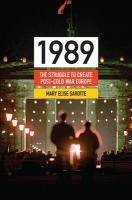Read more
Zusatztext "Using multiple data from interviews with historical figures involved, biographies and extensive archival sources, she recounts the conversations, communiqués and personalities central to the events. This is a major contribution to scholarship in this field." ---Larry Ray, European History Quarterly Informationen zum Autor Mary Elise Sarotte is professor of history and of international relations at the University of Southern California. She is a member of the Council on Foreign Relations and the author of Dealing with the Devil and German Military Reform and European Security . She has served as a White House Fellow and is a member of the Council on Foreign Relations. Zusammenfassung How the political events of 1989 shaped Europe after the Cold War There are unique periods in history when a single year witnesses the total transformation of international relations. The year 1989 was one such crucial watershed. This book uses previously unavailable sources to explore the momentous events following the fall of the Berlin Wall twenty years ago and the effects they have had on our world ever since. Based on documents, interviews, and television broadcasts from many different locations, including Moscow, Berlin, Bonn, Paris, London, and Washington, 1989 describes how Germany unified, NATO expansion began, and Russia got left on the periphery of the new Europe. Mary Sarotte explains that while it was clear past a certain point that the Soviet Bloc would crumble, there was nothing inevitable about what would follow. A wide array of political players--from leaders like Mikhail Gorbachev, Helmut Kohl, George H. W. Bush, and James Baker, to organizations like NATO and the European Community, to courageous individual dissidents--all proposed courses of action and models for the future. In front of global television cameras, a competition ensued, ultimately won by those who wanted to ensure that the "new" order looked very much like the old. Sarotte explores how the aftermath of this fateful victory, and Russian resentment of it, continue to shape world politics today. Presenting diverse perspectives from the political elite as well as ordinary citizens, 1989 is compelling reading for anyone who cares about international relations past, present, or future. ...

